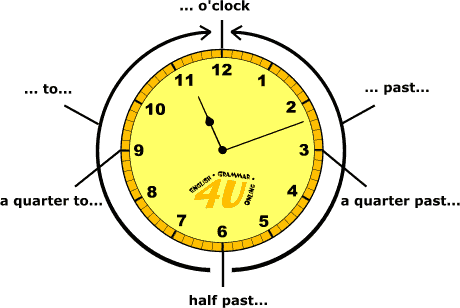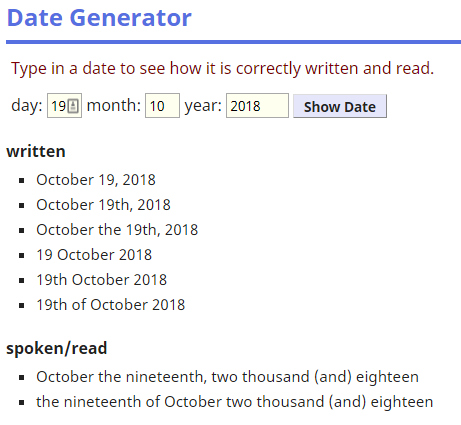What's the Time in English?
Explanation
There are two common ways of telling the time.
Formal but easier way
Say the hours first and then the minutes.
- Example:7:45 - seven forty-five
For minutes 01 through 09, you can pronounce the '0' as oh.
- Example:11:06 - eleven (oh) six
More popular way
- Say the minutes first and then the hours. Use past and the preceding (vt.在..之前发生,先于,领先)hour for minutes 01 through 30. Use to and the forthcoming(adj.即将到来的,现成的,乐于助人的,n.来临,临近) hour for minutes 31 through 59, but .
- Example: 7.15 - fifteen minutes past seven
- Example: 7.45 - fifteen minutes to eight
- Another possibility of saying '15 minutes past' is: a quarter(n.四分之一,一刻钟) past
- Another possibility of saying '15 minutes to' is: a quarter to
- Another possibility of saying '30 minutes past' is: half past
- Example: 5:30 - half past five
Watch

Note
Use o'clock only at the full hour.
- Example: 7:00 - seven o'clock
- (but 7:10 - ten past seven)
In English ordinary speech, the twelve-hour clock is used.![]()
- Beispiel: 17:20 - twenty past five
For times around midnight or midday you can use the expressions midnight or midday / noon instead of the number 12.
- Beispiel: 00:00 - midnight(n.午夜,子夜)
- Beispiel: 12:00 - midday(n.中午,正午) or noon(n.晌午;正午)
To make clear (where necessary) whether you mean a time before 12 o'clock noon or after, you can use in the morning, in the afternoon, in the evening, at night.
- Use in the morning before 12 o'clock noon,
- after 12 o'clock noon use in the afternoon.
When to change from afternoon to evening, from evening to night and from night to morning depends on your sense of time.
- Example: 3:15 - a quarter past three in the morning
- OR a quarter past three at night
NOTE:
More formal expressions to indicate whether a time is before noon or after are a.m.(also: am - ante meridiem, before noon) and p.m. (also: pm - post meridiem, after noon). Use these expression only with the formal way of telling the time.
- Example: 3:15 - three fifteen a.m.
It is not usual to use a.m. and p.m. with past/to.
- Example: 3:15 - fifteen minutes past three
- OR a quarter past three
American English
Beside past Americans often use after.
- Example: 06:10 - ten past/after six
But: in time expressions with half past it is not usual to replace past by after.
Beside to Americans often use before, of or till.
- Example: 05:50 - ten to/before/of/till six
Dates in Written English
British English
In British English the day is usually put before the month. If you wish, you can add the ending of the ordinal number. The preposition of before the month is usually dropped. You can put a comma before the year, but this is not common anymore in British English. ![]()

Example: 5(th) (of) October(,) 2004
American English
In American English the month is usually put before the day. If you wish, you can put the definite article before the day. It is common to write a comma before the year.
Example: October (the) 5(th), 2004
Using digits
You can also write the date by using numbers only. The most common forms are:
Example: 5/10/04 or 5-10-04
Note, however, that 5/10/04 usually means 5 October 2004 in British English and May 10, 2004 in American English. To avoid any possible confusion, you should spell out the month or use the abbreviation.
Dates in Spoken English
If you put the day before the month, use the definite article before the day and the preposition of before the month.
5 October 2004 - the fifth of October, two thousand and four
If you put the month before the day, use the definite article before the day in British English. In American English, the definite article can be dropped.
October 5, 2004 - October (the) fifth, two thousand and four
Years
From 2000 onwards, years are pronounced like ordinary cardinal numbers.
- 2000 - two thousand
- 2003 - two thousand and three
Earlier years are pronounced differently: the first two figures are a number and the last two figures are a number. They can be joined by hundred and, which is only necessary, however, if the last two figures are 00 through 09.
- 1999 - nineteen (hundred and) ninety-nine
- 1806 - eighteen hundred and six /
- eighteen oh six
If you want to give the year without an exact date, use the preposition in:
- I was born in 1972.
To distinguish between dates before and after the birth of Christ, use BC und AD:
- BC = 'Before Christ'
- AD = 'Anno Domini' (in the year of the Lord)
Months and Days of the Week
Note that the months and days of the week are always capitalised. If you don't want to write the whole words, you can use the abbreviations. In British English, abbreviations are usually written without full stops (Apr), full stops are normal, however, in American English (Apr.).
Months are abbreviated (abbreviate v.缩写)as follows:
| Month | Abbreviation | Month | Abbreviation |
|---|---|---|---|
| January | Jan | July | - |
| February | Feb | August | Aug |
| March | Mar | September | Sept |
| April | Apr | October | Oct |
| May | - | November | Nov |
| June | - | December | Dec |
Days of the week are abbreviated(abbreviate v.缩写) as follows:
| Day | Abbreviation |
|---|---|
| Monday | Mon |
| Tuesday | Tue |
| Wednesday | Wed |
| Thursday | Thu |
| Friday | Fri |
| Saturday | Sat |
| Sunday | Sun |






















 590
590











 被折叠的 条评论
为什么被折叠?
被折叠的 条评论
为什么被折叠?








